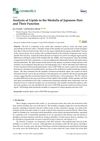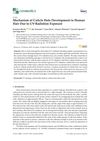1 citations,
January 2024 in “Pharmaceuticals” A new carrier improves skin delivery of tofacitinib for treating inflammatory skin diseases.
51 citations,
October 2002 in “Archives of dermatology” The document does not conclude the effectiveness of the 800-nm pulsed-diode laser for treating scalp cellulitis.
 51 citations,
November 2011 in “Reproductive Biology and Endocrinology”
51 citations,
November 2011 in “Reproductive Biology and Endocrinology” About 13% of women had idiopathic hirsutism and 8.5% had polycystic ovary syndrome in a group of Iranian women.
 22 citations,
November 2018 in “Breast Cancer Research and Treatment”
22 citations,
November 2018 in “Breast Cancer Research and Treatment” The medications 5α-reductase inhibitors and spironolactone are generally safe for breast cancer patients on endocrine therapies and do not significantly increase breast cancer risk.
 17 citations,
January 2019 in “Journal of cancer”
17 citations,
January 2019 in “Journal of cancer” The formula YH0618 can reduce the harmful side effects of the chemotherapy drug Doxorubicin and protect healthy cells.
 10 citations,
February 2017 in “Hormone Molecular Biology and Clinical Investigation”
10 citations,
February 2017 in “Hormone Molecular Biology and Clinical Investigation” Metformin effectively improves metabolic symptoms in women with PCOS, while alfacalcidiol does not have a significant impact.
![Discovery of 7-Methoxy-6-[4-(4-Methyl-1,3-Thiazol-2-yl)-1H-Imidazol-5-yl]-1,3-Benzothiazole (TASP0382088): A Potent and Selective Transforming Growth Factor-β Type I Receptor Inhibitor as a Topical Drug for Alopecia](/images/research/9620bd26-3366-4f2a-bcac-f511697bbc41/small/35997.jpg) 6 citations,
January 2013 in “Chemical & pharmaceutical bulletin/Chemical and pharmaceutical bulletin”
6 citations,
January 2013 in “Chemical & pharmaceutical bulletin/Chemical and pharmaceutical bulletin” A new compound shows promise as a topical treatment for hair loss.
 40 citations,
July 2013 in “Skin Pharmacology and Physiology”
40 citations,
July 2013 in “Skin Pharmacology and Physiology” Male skin gets drier and more alkaline as it ages, which may need different skincare than women's skin.
 2 citations,
May 2021 in “Molecules”
2 citations,
May 2021 in “Molecules” A new method was created to analyze certain chemicals in the urine of alopecia areata patients, revealing they have higher metanephrine content. This method can also be used for other related diseases.
 1 citations,
January 2017 in “Springer eBooks”
1 citations,
January 2017 in “Springer eBooks” Flavonoids and Nod factors are key for legume plant growth and could help in sustainable farming.
 232 citations,
October 2015 in “International journal of molecular sciences”
232 citations,
October 2015 in “International journal of molecular sciences” Stem cells are crucial for skin repair and new treatments for chronic wounds.
 58 citations,
November 2020 in “International Journal of Molecular Sciences”
58 citations,
November 2020 in “International Journal of Molecular Sciences” SHBG may be a useful early indicator and treatment target for PCOS.
 55 citations,
June 2013 in “Dermatologic Surgery”
55 citations,
June 2013 in “Dermatologic Surgery” Ablative fractional resurfacing could improve how well topical drugs penetrate the skin, but more research is needed to fine-tune the method.
 19 citations,
August 2014 in “Journal of Ethnopharmacology”
19 citations,
August 2014 in “Journal of Ethnopharmacology” The study created a test that found hormonal and toxic effects in plant and fungal extracts using prostate cancer cells.
 15 citations,
May 2007 in “Hormones and Behavior”
15 citations,
May 2007 in “Hormones and Behavior” Finasteride boosts morphine's pain relief, stops tolerance, and reduces withdrawal in rats.
 7 citations,
April 2018 in “Cosmetics”
7 citations,
April 2018 in “Cosmetics” Lipids in Japanese hair help maintain glossiness and structure.
 49 citations,
October 2017 in “Nutrients”
49 citations,
October 2017 in “Nutrients” Equisetum debile extract, especially the ethyl acetate type, may be a promising natural ingredient for anti-hair loss products.
 14 citations,
April 2021 in “Biology”
14 citations,
April 2021 in “Biology” Thai rice bran extracts, especially from Tubtim Chumphae rice, can significantly reduce the activity of hair loss genes, with x-tocopherol showing potential as an anti-hair loss product.
 11 citations,
October 2017 in “International Journal of Molecular Sciences”
11 citations,
October 2017 in “International Journal of Molecular Sciences” A new drug delivery system using oil body-bound oleosin-rhFGF-10 improves wound healing and hair growth in mice.
 86 citations,
August 2011 in “Toxicological sciences”
86 citations,
August 2011 in “Toxicological sciences” TCDD speeds up skin barrier formation by increasing certain gene expressions.
 26 citations,
May 2021 in “International Journal of Molecular Sciences”
26 citations,
May 2021 in “International Journal of Molecular Sciences” Cheonggukjang may help prevent and manage various diseases and improve overall health, but its odor and safety concerns need addressing.
 3 citations,
March 2021 in “Metabolites”
3 citations,
March 2021 in “Metabolites” Hair loss causes differ between men and women due to changes in hormone levels and inflammation-related pathways.
 15 citations,
November 2020 in “Pharmaceutics”
15 citations,
November 2020 in “Pharmaceutics” Tofacitinib nanoparticles can safely and effectively treat alopecia areata by targeting hair follicles.
 8 citations,
March 2018 in “Cosmetics”
8 citations,
March 2018 in “Cosmetics” UV radiation damages hair by creating holes and peeling cuticle layers.
 29 citations,
January 2016 in “Annals of dermatology/Annals of Dermatology”
29 citations,
January 2016 in “Annals of dermatology/Annals of Dermatology” Arachidonic acid helps hair grow by increasing growth factors and improving follicle health.
 9 citations,
November 2009 in “Recent Patents on Drug Delivery & Formulation”
9 citations,
November 2009 in “Recent Patents on Drug Delivery & Formulation” Microemulsions could improve how drugs are delivered and absorbed in the body.
 6 citations,
October 2017
6 citations,
October 2017 Indian Gooseberry has potential for cancer prevention and treatment and promotes hair growth.
 January 2024 in “Theranostics”
January 2024 in “Theranostics” Exosomes from special stem cells help treat ulcerative colitis by reducing inflammation and stress.
 34 citations,
May 2012 in “International Journal of Molecular Sciences”
34 citations,
May 2012 in “International Journal of Molecular Sciences” Dieckol from Ecklonia cava may help hair growth and could be a potential hair loss treatment.
 23 citations,
February 2015 in “International Journal of Molecular Sciences”
23 citations,
February 2015 in “International Journal of Molecular Sciences” Colchicine can inhibit hair growth by affecting cell activity and protein expression in hair follicles.




![Discovery of 7-Methoxy-6-[4-(4-Methyl-1,3-Thiazol-2-yl)-1H-Imidazol-5-yl]-1,3-Benzothiazole (TASP0382088): A Potent and Selective Transforming Growth Factor-β Type I Receptor Inhibitor as a Topical Drug for Alopecia](/images/research/9620bd26-3366-4f2a-bcac-f511697bbc41/small/35997.jpg)






















